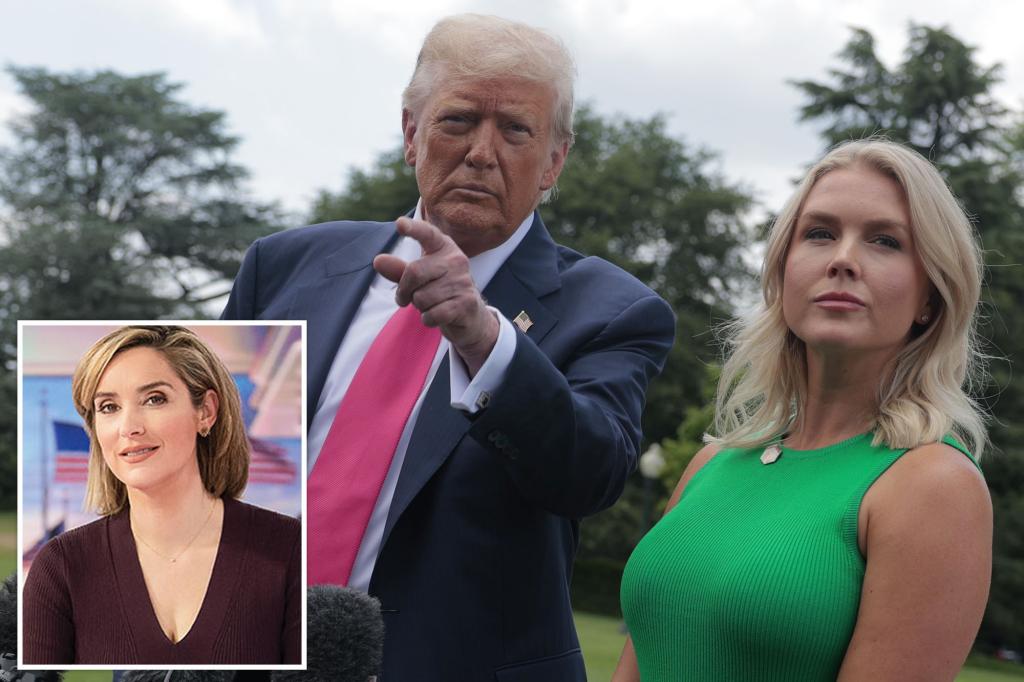In a surprising turn of events at the White House, President Donald Trump and his press secretary, Karoline Leavitt, launched a scathing attack on CBS News anchor Margaret Brennan. During an interview with a Daily Caller reporter, the “Face the Nation” host was labeled “stupid” and “nasty,” sparking widespread media attention and raising questions about the decorum of political discourse.
This incident highlights the ongoing tension between the Trump administration and mainstream media outlets, particularly CBS News. Brennan, known for her tough questioning and in-depth interviews, has often been a target of criticism from conservative circles. The public bashing by Trump and Leavitt underscores the administration’s contentious relationship with journalists perceived as biased.
This article delves into the details of the incident, exploring the context, reactions, and broader implications of this public condemnation. We’ll examine the specific remarks made by Trump and Leavitt, the response from CBS News, and the potential impact on the media landscape.
Trump and Leavitt’s Harsh Words for Brennan
During the White House interview, President Trump didn’t hold back his disdain for Margaret Brennan. According to the New York Post, Trump stated, “The woman on ‘Face the Nation’ is so bad.” Karoline Leavitt chimed in, identifying Brennan by name, to which Trump followed up by asking Leavitt what she thought of Brennan. Leavitt responded with a blunt, “She’s stupid. You can put that on the record.” Trump added, “She’s nasty.” These remarks, delivered within the confines of the White House, quickly made headlines across the country.
The comments were made during an interview with Reagan Reese, a White House correspondent for the right-wing news site Daily Caller, indicating a strategic choice to voice these criticisms to a more sympathetic media outlet. This aligns with a pattern of the Trump administration favoring conservative media sources over mainstream outlets.
Trump Questions Rubio’s Appearances on “Face the Nation”
President Trump also expressed surprise that Secretary of State Marco Rubio continues to appear on Brennan’s show. According to the New York Post, Trump said, “The level of hatred, I’m surprised he goes on there, the level of hatred when they’re asking the question.” This comment suggests Trump believes Brennan and “Face the Nation” exhibit a bias against him and his allies, making Rubio’s continued appearances on the show puzzling to the former president.
This aspect of the interview underscores Trump’s broader strategy of questioning the motivations and allegiances of individuals who engage with media outlets perceived as critical of his administration. It also highlights the pressure placed on Republican figures to align with Trump’s views on media engagement.
Trump’s Criticism of CBS News’ Edited Interview with Harris
Earlier in the interview, Trump targeted CBS News for its controversially edited “60 Minutes” interview with Kamala Harris, particularly over claims of election interference. This criticism reflects a long-standing অভিযোগ that CBS News and other mainstream media outlets present biased coverage against him and his administration.
According to the original article, Nora O’Donnell – who was recently replaced – also caught flak from the president. “It’s like if they had Nora O’Donnell, anybody could do this. You could take 50% of the women off the street, they’d do just as good,” Trump said. These comments demonstrate Trump’s willingness to personally critique media figures and challenge their professional competence.
Karoline Leavitt: Rising Star in the Trump Administration
Karoline Leavitt, the White House press secretary, is a prominent figure in the Trump administration, known for her staunch defense of the president and her active role in shaping the administration’s media strategy. Her agreement with Trump’s criticism of Margaret Brennan underscores her alignment with the president’s views on media bias and accountability.
According to the New York Post, Leavitt replied: “She’s stupid. You can put that on the record.”
Trump Praises the Daily Caller Audience
Trump also praised the audience at the Daily Caller, a right-wing news site founded in 2010 by Tucker Carlson and former Dick Cheney aide Neil Patel. This praise underscores Trump’s preference for engaging with media outlets that cater to his base and share his political views.
According to the original article, Patel bought out Calson’s stake in 2020. “People don’t realize how big our market is,” Trump said, referencing people who voted for him. This statement highlights Trump’s awareness of his dedicated following and his strategy of appealing directly to his supporters through friendly media channels.
Implications and Consequences of the Attack
The public bashing of Margaret Brennan by President Trump and Karoline Leavitt carries several significant implications. It further strains the relationship between the White House and CBS News, potentially affecting the network’s ability to cover the administration objectively. It also reinforces the perception of a biased media landscape, with Trump and his allies positioning themselves against what they see as unfair coverage.
This incident also sets a precedent for future interactions between political figures and the media. The willingness to publicly attack journalists by name could embolden others to engage in similar behavior, further eroding trust and civility in political discourse. The consequences of such actions extend beyond individual relationships, impacting the broader media landscape and the public’s understanding of political events.
Conclusion: Reflecting on Media Relations and Political Discourse
The public condemnation of Margaret Brennan by President Trump and Karoline Leavitt serves as a stark reminder of the contentious relationship between the Trump administration and mainstream media outlets. The remarks made during the White House interview underscore the administration’s views on media bias and accountability, while also highlighting the potential consequences for future interactions between political figures and journalists.
As the media landscape continues to evolve, it is essential to reflect on the importance of objectivity, civility, and mutual respect in political discourse. The incident involving Margaret Brennan serves as a case study for examining the complexities of media relations and the ongoing challenges of maintaining trust and transparency in the dissemination of information.

Leave a Reply